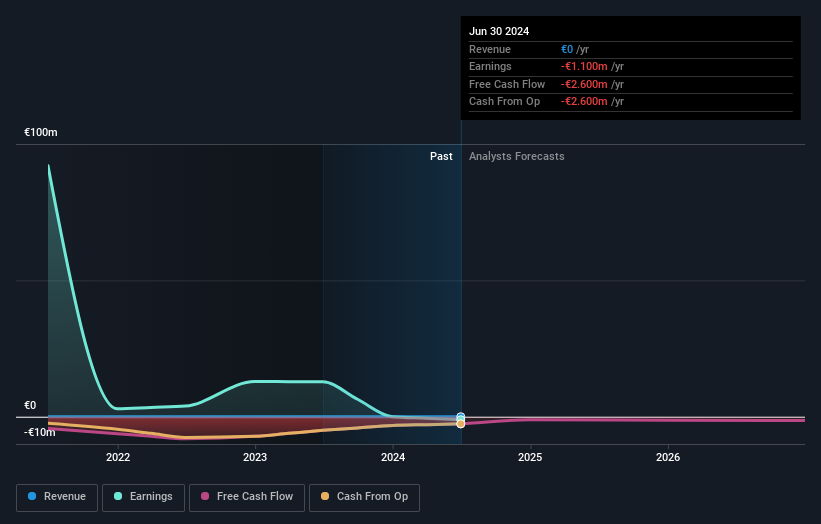Hedge funds investors control 28% of Malin Corporation plc (ISE:MLC) and were rewarded last week after stock increased 16%
Key Insights
- Institutions’ substantial holdings in Malin implies that they have significant influence over the company’s share price
- The top 3 shareholders own 50% of the company
- Insider ownership in Malin is 17%
If you want to know who really controls Malin Corporation plc (ISE:MLC), then you’ll have to look at the makeup of its share registry. We can see that hedge funds own the lion’s share in the company with 28% ownership. In other words, the group stands to gain the most (or lose the most) from their investment into the company.
And last week, hedge funds investors ended up benefitting the most after the company hit €179m in market cap. One-year return to shareholders is currently 107% and last week’s gain was the icing on the cake.
In the chart below, we zoom in on the different ownership groups of Malin.
Check out our latest analysis for Malin
What Does The Institutional Ownership Tell Us About Malin?
Institutions typically measure themselves against a benchmark when reporting to their own investors, so they often become more enthusiastic about a stock once it’s included in a major index. We would expect most companies to have some institutions on the register, especially if they are growing.
We can see that Malin does have institutional investors; and they hold a good portion of the company’s stock. This suggests some credibility amongst professional investors. But we can’t rely on that fact alone since institutions make bad investments sometimes, just like everyone does. If multiple institutions change their view on a stock at the same time, you could see the share price drop fast. It’s therefore worth looking at Malin’s earnings history below. Of course, the future is what really matters.

It would appear that 28% of Malin shares are controlled by hedge funds. That catches my attention because hedge funds sometimes try to influence management, or bring about changes that will create near term value for shareholders. The company’s largest shareholder is Pentwater Capital Management LP, with ownership of 28%. Sean O’Driscoll is the second largest shareholder owning 11% of common stock, and Reedy Creek Investments LLC holds about 11% of the company stock.
To make our study more interesting, we found that the top 3 shareholders have a majority ownership in the company, meaning that they are powerful enough to influence the decisions of the company.
While studying institutional ownership for a company can add value to your research, it is also a good practice to research analyst recommendations to get a deeper understand of a stock’s expected performance. Our information suggests that there isn’t any analyst coverage of the stock, so it is probably little known.
Insider Ownership Of Malin
The definition of an insider can differ slightly between different countries, but members of the board of directors always count. The company management answer to the board and the latter should represent the interests of shareholders. Notably, sometimes top-level managers are on the board themselves.
Insider ownership is positive when it signals leadership are thinking like the true owners of the company. However, high insider ownership can also give immense power to a small group within the company. This can be negative in some circumstances.
It seems insiders own a significant proportion of Malin Corporation plc. Insiders have a €31m stake in this €179m business. This may suggest that the founders still own a lot of shares. You can click here to see if they have been buying or selling.
General Public Ownership
With a 23% ownership, the general public, mostly comprising of individual investors, have some degree of sway over Malin. While this group can’t necessarily call the shots, it can certainly have a real influence on how the company is run.
Private Equity Ownership
Private equity firms hold a 10% stake in Malin. This suggests they can be influential in key policy decisions. Some investors might be encouraged by this, since private equity are sometimes able to encourage strategies that help the market see the value in the company. Alternatively, those holders might be exiting the investment after taking it public.
Private Company Ownership
We can see that Private Companies own 11%, of the shares on issue. It might be worth looking deeper into this. If related parties, such as insiders, have an interest in one of these private companies, that should be disclosed in the annual report. Private companies may also have a strategic interest in the company.
Next Steps:
While it is well worth considering the different groups that own a company, there are other factors that are even more important. To that end, you should be aware of the 3 warning signs we’ve spotted with Malin .
If you would prefer check out another company — one with potentially superior financials — then do not miss this free list of interesting companies, backed by strong financial data.
NB: Figures in this article are calculated using data from the last twelve months, which refer to the 12-month period ending on the last date of the month the financial statement is dated. This may not be consistent with full year annual report figures.
New: Manage All Your Stock Portfolios in One Place
We’ve created the ultimate portfolio companion for stock investors, and it’s free.
• Connect an unlimited number of Portfolios and see your total in one currency
• Be alerted to new Warning Signs or Risks via email or mobile
• Track the Fair Value of your stocks
Try a Demo Portfolio for Free
Have feedback on this article? Concerned about the content? Get in touch with us directly. Alternatively, email editorial-team (at) simplywallst.com.
This article by Simply Wall St is general in nature. We provide commentary based on historical data and analyst forecasts only using an unbiased methodology and our articles are not intended to be financial advice. It does not constitute a recommendation to buy or sell any stock, and does not take account of your objectives, or your financial situation. We aim to bring you long-term focused analysis driven by fundamental data. Note that our analysis may not factor in the latest price-sensitive company announcements or qualitative material. Simply Wall St has no position in any stocks mentioned.


0 Comment